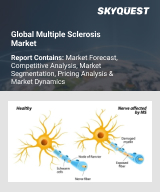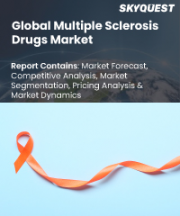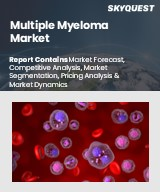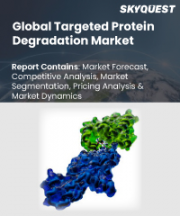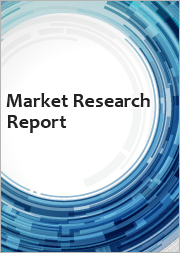
|
시장보고서
상품코드
1750755
면역조절제 치료 시장(2024-2030년)Immunomodulator Therapeutics Market, Global, 2024-2030 |
||||||
메커니즘을 표적으로 한 접근법은자가 면역, 종양 및 염증성 치료에서 혁신을 가능하게 하고 혁신적인 성장을 이끌어냅니다.
이 연구서비스는 특히 면역학, 소화기(GI), 피부과학 분야의 염증성 질환을 대상으로 한 세계의 면역조절제 치료 시장을 종합적으로 분석했습니다. 모달리티별, 주요 적응증별로 분류하여 주요 시장 진출기업의 분석과 함께 6년간 세계의 면역조절제 치료 시장 수익 예측을 제공합니다. 일반적인 비즈니스 모델과 새로운 비즈니스 모델에 대해 고찰해, 면역조절제 치료 시장 진입과 상환의 동향을 분석했으며, 경쟁 평가와 수익 점유율 분석도 실시했습니다. 효과적인 질병 관리를 위해 파괴적인 가상 케어 기술과 보조 요법을 개척하는 주요 기업에 하이라이트를 맞추고 있습니다.
수익과 예측
2024년의 수익은 930억 달러였으며, 조사 기간 2024-2030년의 CAGR은 9.0%
분석 범위
- 이 조사 서비스는 면역학, 소화기(GI), 피부과학의 염증성 질환을 대상으로 한 세계의 면역조절제 치료 시장 상세 개요를 제공합니다.
- 본 보고서에서는 기존의 병적 면역반응을 수식(억제 또는 억제) 및 조절함으로써 질환을 치료하도록 설계된 제품에 의해 시장을 정의하고 있습니다.
- 세계의 면역조절제 치료의 잠재적 수익을 예측하고, 업계 진출기업의 분석을 포함한 6년간의 수익 예측을 제공합니다.
- 본 조사에서는 시장 전체의 지역별 수익 점유율을 베스트 에포트 기반으로 추계하고 있습니다.
- 본 보고서에서는 면역조절제 치료의 가장 흔하고 새로운 비즈니스 모델, 시장 접근, 상환 동향에 대해 논의했습니다.
- 이 보고서는 시장 성장에 영향을 미치는 주요 시장 성장 촉진요인과 성장 촉진요인, 의약품 개발 동향, 파트너십, 투자 및 통합 활동을 다룹니다.
- 파괴적인 가상 케어 기술과 질병 관리를 위한 보조 요법을 개발하는 획기적인 기업에 관한 간단한 인사이트력을 제공합니다.
- 임상 요구, 기술 동향, 비즈니스 모델, 경쟁 전망에 근거해 업계 기업의 새로운 성장 기회를 특정합니다.
면역조절제 치료 산업의 전략적 중요 과제 톱 3의 영향
파괴적인 기술
- 배경 : 자가면역질환, 특히 여성의 이환율이 증가하고 있습니다.
- 프로스트의 시점 : 저분자, 생물학적 제제, 세포 및 유전자 치료제에 걸치는 약제 클래스별(JAK1, IL, 칼시뉴린, TNF, TYK2, PDE4) 보다 좋은 임상 결과를 얻기 위해서, 복수의 작용기전을 이용하는 병용 요법에의 경향이 강해진다고 생각됩니다.
사내 과제
- 배경 : 휴미라나 스텔라라와 같은 수익을 창출하는 블록버스터 의약품이 독점권을 잃고, 수익 손실과 바이오시밀러 경쟁의 격화로 이어지기 때문에 파이프라인의 성장이 급무가 되어 연구개발(R&D)의 강화가 요구되고 있습니다.
- 서리 관점 : 기업은 비용과 위험을 분담하고 공동 연구 개발을 통해 혁신을 촉진하기 위해 전략적 파트너십을 점점 더 모색 할 수 있습니다. 여성 특유의 치료제 등 시장 진입이나 적정 가격으로의 판매를 유리하게 진행할 수 있다고 생각됩니다.
변혁의 메가 트렌드
- 배경 : 헬스케어 시스템은 현재와 미래 지출을 억제할 필요가 있습니다.
- 서리 견해 : 제약 회사는 MoA 기반 신규 표적 치료제의 승인을 가속화하고 미래의 정밀의료를 추진하기 위해 증거 창출을위한 적응 시험 디자인에 투자합니다. 이다헬스 등)과 제휴함으로써 진단 전달 서비스를 활용하여 환자 접근을 개선하고 신흥 시장 확대 전략에 주력합니다.
주요 경쟁업체
- ABBVIE
- J&J
- ELI LILLY
- ASTRAZENECA
- MERCK & CO
- SANOFI
- NOVARTIS
- AMGEN
- PFIZER
- GSK
- UCB
- BRISTOL MYERS SQUIBB
- ROCHE
- BOEHRINGER INGELHEIM
- ARGENX
- REGENERON PHARMACEUTICALS
- NOVO NORDISK
- REPERTOIRE IMMUNE MEDICINES
- INCYTE
- MALLINCKRODT PHARMACEUTICALS
- ASAHI KASEI
- AFIBBIDY
- SWEDISH ORPHAN BIovitrum
- ANH PHARMACEUTICALS
- VERA THERAPEUTICS
- RIGEL PHARMACEUTICALS
- ASTELLAS PHARMA
- TAKEDA
- CHUGAI PHARMA
- MITSUBISHI CHEMICAL
- SUN PHARMACEUTICAL INDUSTRIES
- SHANGHAI PHARMACEUTICALS HOLDING
- ZAI LAB
- INNOVENT BIOLOGICS
- KISSEI PHARMACEUTICAL
- BIOCON
- OTSUKA PHARMA
- SUMITOMO PHARMA
- CELLTRION
- 3BIO
- TEVA PHARMA
- KYOWA KIRIN
- DR REDDY'S LAB
- JIANGSHENG HENGHUI PHARMACEUTICALS
- HIKMA PHARMACEUTICALS ALS
- INTAS PHARMACEUTICALS LTD
- LABORATORIO ELEA PHOENIX SA
- IMMUNICORE HOLDINGS PLC
- SUNSHINE GUOJIAN PHARMACEUTICAL
성장 촉진요인
자가면역 질환 및 염증성 질환의 유병률 상승
루푸스, RA, 크론병, 건선과 같은 질병의 유병률 증가는 종양 괴사 인자(TNF) 억제제(예 : 휴미라, 레미케이드) 및 JAK 억제제(예 : 제르얀츠)와 같은 면역조절제 수요를 촉진하고 있습니다. 급속하게 고령화가 진행되는 세계에서는 만성적인 자가면역 질환에 걸리기 쉬워지고 있습니다. 그 때문에 보다 인용성이 높은 생물학적 제제 등, 고령자에 맞춘 치료에 대한 수요가 더욱 높아지고 있습니다.
생명 공학의 진보
CGT, 이중특이적 항체, RNA 요법 등 바이오테크놀러지 플랫폼과 첨단 치료법의 혁신은 면역조절제의 효능과 안전성 프로파일을 높여 차세대 표적요법의 개발을 촉진하고 있습니다. 카리스마 테라퓨틱스와 모더나는 자가면역 질환에 대한 대식세포 공학적 접근법을 개발하기 위해 카리스마의 독점적인 CAR-M 기술과 모더나의 mRNA/지질 나노입자(LNP) 플랫폼을 사용하기 위해 협력하고 있습니다.
R&D 투자 확대
관민 쌍방으로부터의 자금 제공 증가에 의해 신규 치료법의 발견이나 기존 치료법의 개량을 위한 연구개발 노력이 가속하고 있습니다.NIH는 면역 조절 요법의 연구에 다액의 자금을 할당하고 있어, 혁신을 촉진하고 있습니다.
암 영역에서의 성공과 용도 확대
암 영역에서의 면역요법의 성공은 자가면역질환과 염증성 질환의 치료에 있어서 유사한 접근법의 인식과 수용을 향상시켰습니다.
성장 억제요인
면역조절제 치료 : 세계의 성장 억제요인(2025-2030년)
엄격한 규제 과정 : 면역조절제 치료의 승인과 신규 작용 메커니즘의 개발에 관한 세계적으로 엄격한 규제 과정은 제약 기업 시장 진입 지연과 개발 비용의 상승을 초래할 수 있습니다. 게다가 세계적으로 환불이나 보험 적용이 불충분하기 때문에 특히 공적의료제도나 헬스케어 자원이 한정되어 있는 지역에서는 대규모의 도입이 저해될 가능성이 있습니다. 고비용 신약 보험 적용이 불충분하면 장기적인 질병 관리에 드는 비용이 증가하여 환자 규정 준수 및 시장 성장에 영향을 미칠 수 있습니다.
잠재적 부작용 및 안전성에 대한 우려 : 면역조절제는 감염이나 자가면역 반응의 위험이 증가하는 등 심각한 부작용이 있을 수 있습니다. 예를 들어, 자가면역 질환에서 체크포인트 억제제의 사용은 신중하게 관리해야 하는 면역 관련 부작용과 관련이 있습니다. 해로운 결과와 안전 위험은 시장 회수, 처방의 제한, 환자의 신뢰성 저하 등 규제 당국의 조치로 이어질 수 있으므로 시장 섭취가 어려워집니다.
특허 끊기 : 블록버스터 의약품의 특허 해지는 바이오시밀러 및 제네릭 의약품의 도입으로 이어져 시장 경쟁을 심화시키고 가격 침식을 가져오고 브랜드 의약품 판매 수익의 손실로 이어집니다. 예를 들어, RA, 건선, 크론병, 강직성 척추염 등 여러 자가면역질환으로 승인된 아비의 블록버스터 '휴미라'는 2023년 바이오시밀러와의 경쟁에 직면하기 시작했습니다.
환자 불편 : 생명공학의 진보는 효과적인 생물학적 제형의 개발을 촉진했지만, 치료에는 빈번한 주사와 물방울이 필요하며 환자가 치료 요법을 준수하기가 어렵습니다. 이것은 환자의 전반적인 만족도와 치료 중단에 영향을 줄 수 있습니다.
목차
성장 기회 조사 범위
- 분석 범위
- 세분화
성장 환경 면역조절제 치료의 변화
- 왜 성장이 어려워지고 있는가?
- 전략적 과제 8(TM)
- 면역조절제 치료 업계에서의 전략적 중요과제 톱 3의 임팩트
면역조절 치료제 분야의 생태계
- 유병률의 동향
- 경제적 부담
- 의약품 개발 동향-I&I
- 의약품 개발 동향
- 치험정세
- 임상시험 디자인 동향
- 지역별 규제 동향과 대처
- 시장 성장을 가속하는 동향
- 케어 컨티뉴엄의 기술 솔루션
- R&D 및 상업화를 위한 디지털 솔루션
- 비즈니스 모델
- M&A 평가
- 벤처 금융 평가
- 경쟁 환경
- 주요 경쟁업체
면역조절제 치료의 성장 요인
- 성장 지표
- 성장 촉진요인
- 성장 억제요인
- 조사 방법과 프로세스
- 예측에 관한 고찰
- 예측의 고찰과 한계
수익과 예측
- 수익과 예측 분석
- 제품별 수익 예측
- 제품별 수익 예측 분석
- 기술별 수익 예측
- 용도별 수익 예측
- 지역별 수익 예측
- 지역별 예측 분석
- 시장 진입과 상환 동향
- 가격 동향과 예측 분석
- 수익 점유율
- 수익 점유율 분석
- 주목 기업
성장 발전기 : 기술과 용도
- 성장 지표
- 기술별 수익 예측
- 용도별 수익 예측
- 기술별 수익 분석
- 용도별 수익 분석
성장 발전기 : 전통적인 양식
- 성장 지표
- 수익 예측
- 하위 유형별 수익 예측
- 예측 분석
성장 발전기 : 생명 공학 양식
- 성장 지표
- 수익 예측
- 하위 유형별 수익 예측
- 예측 분석
성장 발전기 : 면역학적 적응증
- 성장 지표
- 수익 예측
- 지역별 수익 예측
- 지역별 예측 분석
- 하위 유형별 수익 예측
- 하위 유형별 예측 분석
성장 발전기 : 염증 적응증
- 성장 지표
- 수익 예측
- 지역별 수익 예측
- 지역별 예측 분석
- 하위 유형별 수익 예측
- 하위 유형별 예측 분석
면역조절제 치료 분야의 성장 기회
- 성장 기회 1 : I&I를 위한 항체 요법
- 성장 기회 2 : 여성 중심의 자가 면역 치료
- 성장 기회 3 : 신흥 시장용 바이오시밀러 의약품
- 성장 기회 4 : 질병 관리 및 어드히어런스를 위한 보조 솔루션
부록 및 다음 단계
- 성장 기회의 장점과 영향
- 다음 단계
- 별지 리스트
- 면책사항
Mechanism-targeted Approaches are Driving Transformational Growth by Enabling Innovation in Autoimmune, Oncology, and Inflammatory Therapies
This research service offers a comprehensive analysis of the global immunomodulator therapeutics market, specifically targeting inflammatory disorders in the immunology, gastrointestinal (GI), and dermatology segments. The report defines this market through products designed to modify and regulate pathological immune responses, either by inhibiting or suppressing them. It categorizes the market by modality and key indications, providing a 6-year revenue forecast for global immunomodulator prescription drugs, alongside an analysis of key industry participants. The geographic scope encompasses North America, Europe, Asia-Pacific (APAC), the Middle East and Africa (MEA), and Latin America (LATAM), with regional revenue share estimates presented on a best-effort basis. The report also discusses prevalent and emerging business models, analyzes trends in market access and reimbursement for immunomodulator therapies, and offers competitive assessments and revenue share analyses. It examines the factors driving and restraining growth in this space, offering insights into drug development trends, partnerships, and the investment landscape. The report highlights key companies pioneering disruptive virtual care technologies and adjunctive therapies for effective disease management. Based on clinical needs, technological advancements, business models, and competitive dynamics, the report identifies the growth opportunities emerging from this space for market players and stakeholders to leverage. The base year is 2024, and the forecast period is from 2025 to 2030.
Revenue Forecast
Revenue estimate for the base year 2024 is $93 billion with a CAGR of 9.0% for the study period 2024-2030.
Scope of Analysis
- This research service provides a detailed overview of the global immunomodulator therapeutics market for immunology, gastrointestinal (GI), and dermatology inflammatory disorders.
- The report defines the market by products designed to treat diseases by modifying (inhibiting or suppressing) and regulating a pre-existing, pathological immune response. The market is further broken down by modality and key indications.
- It forecasts the potential revenue of global immunomodulator prescription drugs and provides a 6-year revenue forecast, including an analysis of industry participants.
- The research provides regional revenue share estimates of the overall market on a best-effort basis. The geographic scope includes North America, Europe, Asia-Pacific (APAC), the Middle East and Africa (MEA) and Latin America (LATAM).
- It discusses the most prevalent and emerging business models, market access, and reimbursement trends for immunomodulator therapies. It also covers revenue share analysis and competitive assessments and identifies key market trends.
- The report highlights the primary market drivers and restraints, drug development trends, partnerships, and investment and consolidation activities that affect market growth.
- It provides brief insights into game-changing companies developing disruptive virtual care technologies and adjunctive therapies for disease management.
- It identifies emerging growth opportunities for industry players based on clinical needs, technology trends, business models, and competitive outlooks.
The Impact of the Top 3 Strategic Imperatives on the Immunomodulator Therapeutics Industry
Disruptive Technologies
- Why: There is an increasing incidence of autoimmune diseases, particularly impacting women. Limitations in existing therapies demand more targeted applications.
- Frost Perspective: A new wave of drug classes (JAK1, IL, calcineurin, TNF?, TYK2, PDE4), across small molecules, biologics, and cell and gene therapies, will emerge, offering enhanced efficacy and safety profiles for treating autoimmune and inflammatory conditions. There will be a growing trend towards combination therapies that utilize multiple mechanisms of action to achieve better clinical outcomes.
Internal Challenges
- Why: The industry is moving toward an extended patent cliff, with several revenue-generating blockbuster drugs like Humira and Stelara losing their exclusivity, leading to revenue losses and increased biosimilar competition, creating an urgent need for pipeline growth, and driving increased research and development (R&D). Resource demands for R&D can strain budgets, especially for smaller biotech firms.
- Frost Perspective: Companies may increasingly seek strategic partnerships to share costs and risks, fostering innovation through collaborative R&D efforts. Companies that emphasize unique value propositions in these strategic alliances will be better positioned to access markets/fair pricing with drugs like JAK inhibitors and women-specific therapies. Payers will scrutinize clinical costs and patient outcomes to ensure balance and sustainable reimbursement models that reflect indication-specific needs and improve affordability.
Transformative Megatrends
- Why: Healthcare systems are under pressure to contain current and future spending. Healthcare plan sponsors are considering their next moves as governments contemplate the impact of the Inflation Reduction Act (IRA) 2022, and associated price cuts in the United States.
- Frost Perspective: Firms will invest in adaptive trial designs for evidence generation to expedite approvals for novel MoA-based targeted therapies, advancing precision medicine going forward. Pharma companies will utilize diagnostic delivery services to improve patient access by partnering with telehealth/AI-enabled symptom monitoring platforms (e.g., Ada Health) and focus on an emerging market-expansion strategy. Focus on predictive convergence of drugs and digital therapeutics will likely personalize medicine and improve experiences and outcomes.
Key Competitors
- ABBVIE
- J&J
- ELI LILLY
- ASTRAZENECA
- MERCK & CO
- SANOFI
- NOVARTIS
- AMGEN
- PFIZER
- GSK
- UCB
- BRISTOL MYERS SQUIBB
- ROCHE
- BOEHRINGER INGELHEIM
- ARGENX
- REGENERON PHARMACEUTICALS
- NOVO NORDISK
- BRISTOL MYERS SQUIBB
- REPERTOIRE IMMUNE MEDICINES
- ELI LILLY
- PFIZER
- ASTRAZENECA
- ROCHE
- BOEHRINGER INGELHEIM
- MERCK & CO
- SANOFI
- ARGENX
- UCB
- INCYTE
- MALLINCKRODT PHARMACEUTICALS
- ASAHI KASEI
- AFIBBIDY
- SWEDISH ORPHAN BIovitrum
- ANH PHARMACEUTICALS
- VERA THERAPEUTICS
- RIGEL PHARMACEUTICALS
- ASTELLAS PHARMA
- TAKEDA
- CHUGAI PHARMA
- MITSUBISHI CHEMICAL
- SUN PHARMACEUTICAL INDUSTRIES
- SHANGHAI PHARMACEUTICALS HOLDING
- ZAI LAB
- INNOVENT BIOLOGICS
- KISSEI PHARMACEUTICAL
- BIOCON
- OTSUKA PHARMA
- SUMITOMO PHARMA
- CELLTRION
- 3BIO
- TEVA PHARMA
- KYOWA KIRIN
- DR REDDY'S LAB
- JIANGSHENG HENGHUI PHARMACEUTICALS
- EVA PHARMA
- ROCHE
- TEVA
- ASTELLAS PHARMA
- HIKMA PHARMACEUTICALS ALS
- BOEHRINGER INGELHEIM
- SANOFI
- INTAS PHARMACEUTICALS LTD
- BIOCON
- NOVARTIS
- LABORATORIO ELEA PHOENIX S.A.
- IMMUNICORE HOLDINGS PLC
- CELLTRION
- SUNSHINE GUOJIAN PHARMACEUTICAL
Growth Drivers
Rising Prevalence of Autoimmune and Inflammatory Diseases
Increasing prevalence of diseases like lupus, RA, Crohn's disease, and psoriasis is driving demand for immunomodulators like tumor necrosis factor (TNF) inhibitors (e.g., Humira, Remicade) and JAK inhibitors (e.g., Xeljanz). The rapidly aging global population is more susceptible to chronic autoimmune conditions. It is further bolstering demand for treatments tailored to older adults, such as more tolerable biologics.
Biotech Advancements
Innovations in biotech platforms and advanced modalities such as CGT, bispecific antibodies, and RNA therapies are enhancing the efficacy and safety profiles of immunomodulators and driving the development of next-gen targeted therapies. Carisma Therapeutics Inc. and Moderna, Inc. have collaborated to use Carisma's proprietary CAR-M technology and Moderna's mRNA/lipid nanoparticles (LNP) platform to develop a macrophage engineering approach for autoimmune diseases.
Growing Investment in R&D
Increased funding from both public and private sectors is accelerating R&D efforts for discovering new therapies and improving existing ones. The NIH allocates significant funding for research on immunomodulatory therapies, fostering innovation. An increasing number of M&A deals demonstrate a growing focus on immunology by big pharma.
Success in Oncology and Expanding Applications
The success of immunotherapies in oncology has raised awareness and acceptance of similar approaches in treating autoimmune and inflammatory diseases. For example, Roche's Gazyva/Gazyvaro (obinutuzumab), approved in 100 nations for several lymphoma types, is being investigated in the Phase III REGISTRY trial for lupus nephritis.
Growth Restraints
Immunomodulator Therapeutics: Growth Restraints, Global, 2025-2030
Stringent Regulatory Processes: Stringent regulatory processes for immunomodulatory treatment approval or the development of novel mechanisms of action, globally, can cause delays in market access and raise development expenses for pharmaceutical companies. Moreover, inadequate reimbursement/insurance coverage globally may deter wide-scale adoption, especially in public health systems or regions with limited healthcare resources. Inadequate coverage of high-cost new drugs would increase the expenses of managing long-term conditions, impacting patient compliance and market growth.
Potential Adverse Effects and Safety Concerns: Immunomodulators may have serious adverse effects, such as an elevated risk of infections and autoimmune responses. For example, checkpoint inhibitor use in autoimmune disease is linked to immune-related side effects that need to be carefully managed. Adverse outcomes and safety risks may lead to regulatory actions such as market recalls, limited prescriptions, and reduced patient confidence, challenging market uptake.
Patent Expiry: Expiry of blockbuster drug patents is leading to the introduction of biosimilars and generic versions, intensifying market competition, resulting in price erosions, and leading to a loss of sales revenue for branded products. For example, AbbVie's blockbuster Humira, approved for several autoimmune conditions like RA, psoriasis, Crohn's disease, and ankylosing spondylitis, started facing biosimilar competition in 2023.
Patient Inconvenience: Biotech advancements have facilitated the development of effective biologic therapies; however, therapy administration requires frequent injections or infusions, making it challenging for patients to adhere to their treatment regimens. It may affect overall patient satisfaction and treatment discontinuation.
Table of Contents
Growth Opportunities: Research Scope
- Scope of Analysis
- Segmentation
Growth Environment: Transformation in Immunomodulator Therapeutics
- Why is it Increasingly Difficult to Grow?
- The Strategic Imperative 8™
- The Impact of the Top 3 Strategic Imperatives on the Immunomodulator Therapeutics Industry
Ecosystem in the Immunomodulator Therapeutics Sector
- Prevalence Trends
- Economic Burden
- Drug Development Trends-I&I
- Drug Development Trends
- Trial Landscape
- Clinical Trial Design Trends
- Regulatory Trends and Initiatives by Region
- Trends Advancing Market Growth
- Technology Solutions Across the Care Continuum
- Digital Solutions for R&D and Commercialization
- Business Models
- Mergers and Acquisitions M&As Assessment
- Venture Financing Assessment
- Competitive Environment
- Key Competitors
Growth Generators in Immunomodulator Therapeutics
- Growth Metrics
- Growth Drivers
- Growth Restraints
- Research Process and Methodology
- Forecast Considerations
- Forecast Considerations and Limitations
Revenue Forecast
- Revenue Forecast Analysis
- Revenue Forecast by Product
- Forecast Analysis by Product
- Revenue Forecast by Technology
- Revenue Forecast by Application
- Revenue Forecast by Region
- Forecast Analysis by Region
- Market Access and Reimbursement Trends
- Pricing Trends and Forecast Analysis
- Revenue Share
- Revenue Share Analysis
- Companies to Watch
Growth Generator: Technology & Application
- Growth Metrics
- Revenue Forecast by Technology
- Revenue Forecast by Application
- Revenue Forecast Analysis-Technology
- Revenue Forecast Analysis-Application
Growth Generator: Conventional Modality
- Growth Metrics
- Revenue Forecast
- Revenue Forecast by Sub-type
- Forecast Analysis
Growth Generator: Biotechnology Modality
- Growth Metrics
- Revenue Forecast
- Revenue Forecast by Sub-type
- Forecast Analysis
Growth Generator: Immunology Indications
- Growth Metrics
- Revenue Forecast
- Revenue Forecast by Region
- Forecast Analysis by Region
- Revenue Forecast by Sub-type
- Forecast Analysis by Sub-type
Growth Generator: Inflammation Indication
- Growth Metrics
- Revenue Forecast
- Revenue Forecast by Region
- Forecast Analysis by Region
- Revenue Forecast by Sub-type
- Forecast Analysis by Sub-type
Growth Opportunity Universe in Immunomodulator Therapeutics Sector
- Growth Opportunity 1: Antibody Therapies for I&I
- Growth Opportunity 2: Women-centric Autoimmune Therapies
- Growth Opportunity 3: Biosimilars for Emerging Markets
- Growth Opportunity 4: Adjunctive Solutions for Disease Management and Adherence
Appendix & Next Steps
- Benefits and Impacts of Growth Opportunities
- Next Steps
- List of Exhibits
- Legal Disclaimer






